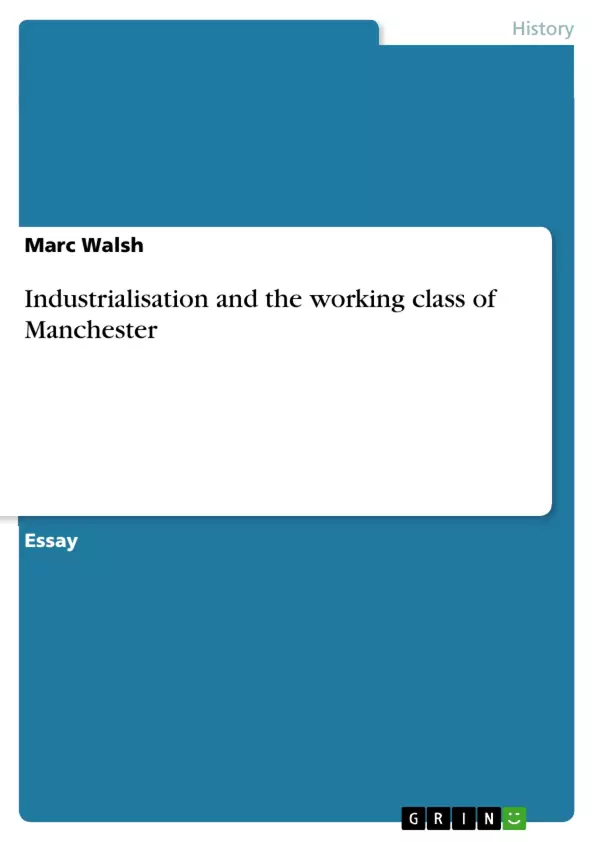The large-scale industrialisation of Manchester and other English cities in the early nineteenth century was without precedent and was subject to significant commentary and interpretation as writers and thinkers were both drawn to and repelled by what seemed to be a new way of living. This essay examines such commentary and how it led to social improvement for the urban working classes of the nineteenth century.
Inhaltsverzeichnis (Table of Contents)
- The Rapid Industrialisation of Manchester
- The Role of the Employer
- Political Economy and the Free Market
- Dissenting Voices and the Reality of Urban Life
- Wages and the 'Invisible Hand'
- Urban Squalor and the Absence of Public Space
- A Paradigm Shift and Civic Improvement
- Social Order, Education, and the Prevention of Marxist Outlook
Zielsetzung und Themenschwerpunkte (Objectives and Key Themes)
This text examines the rapid industrialisation of Manchester in the 19th century, exploring the clash between the theoretical promises of free-market economics and the actual lived experiences of workers in the city. It investigates how industrialization, while generating wealth, also led to social inequality, environmental degradation, and challenging living conditions.
- The impact of industrialisation on urban life and social conditions.
- The contrasting perspectives of political economists and social critics on the consequences of industrialisation.
- The role of the state in mitigating the negative consequences of free-market forces.
- The relationship between industrial development, social inequality, and the potential for social unrest.
- The evolving understanding of the role of the state in regulating and improving urban life.
Zusammenfassung der Kapitel (Chapter Summaries)
- The first chapter introduces the rapid industrialisation of Manchester, highlighting the stark social and economic transformations it brought about. It presents the context of writers and thinkers observing and interpreting this new urban and industrial society, particularly focusing on the working class.
- The second chapter delves into William Rathbone Greg's argument regarding the employer's responsibilities, focusing on the shift from paternalistic social relationships to a more market-driven approach. This chapter explores the alarm this shift generated among those who saw a new social order emerging in the factories.
- The third chapter examines the proponents of political economy and their belief in the inherent benefits of the free market. It discusses the 'invisible hand' principle and the expectation that free competition would lead to greater overall wealth and well-being.
- The fourth chapter focuses on dissenting voices who challenged the optimistic predictions of political economists. It presents the accounts of writers like Friedrich Engels and Léon Faucher, who documented the squalor, environmental degradation, and poor living conditions in Manchester.
- The fifth chapter examines the contrasting views on wages between proponents of political economy and social critics. It highlights Engels and Faucher's observations about the instability and inadequacy of wages in the capitalist system, challenging the predictions of those who believed in the 'invisible hand's' ability to ensure overall good.
- The sixth chapter further explores the arguments against the efficacy of the free market, focusing on the lack of public space and amenities in Manchester. It discusses the concerns raised by Faucher regarding the absence of public squares, promenades, and ventilated buildings, contrasting this with the theoretical ideal of the free market.
- The seventh chapter examines the significant shift in perspective and the emergence of a new zeitgeist in later 19th century Manchester. It highlights the implementation of civic improvements, such as libraries, town halls, and parks, suggesting a move away from unfettered market forces and towards a more planned approach to resource allocation.
- The eighth chapter explores the motives behind these civic improvements, suggesting a concern for social order and the prevention of social unrest. It explores the notion that education and social welfare measures might help mitigate extreme social inequality and prevent the rise of Marxist ideologies.
Schlüsselwörter (Keywords)
The text revolves around the themes of industrialisation, urban development, social inequality, political economy, free market, social criticism, public space, civic improvement, and the role of the state in regulating economic and social conditions. Key figures discussed include Friedrich Engels, Léon Faucher, William Rathbone Greg, and Charles Dickens. The analysis draws on the ideas of Adam Smith and Karl Marx.
Frequently Asked Questions
How did industrialisation affect Manchester in the 19th century?
It led to rapid urban growth, significant wealth for factory owners, but also severe squalor and poor living conditions for the working class.
Who were the main critics of Manchester's industrial conditions?
Writers like Friedrich Engels and Léon Faucher documented the environmental degradation and social inequality in the city.
What is the "invisible hand" in this context?
It is a principle of political economy suggesting that a free market would naturally lead to the best outcome for society, though critics argued it failed the urban poor.
Why were civic improvements like parks and libraries introduced later?
They were implemented to improve social order, public health, and to mitigate the risks of social unrest or Marxist ideologies among workers.
What was William Rathbone Greg's view on employers?
He noted a shift from paternalistic relationships to market-driven ones, where employers felt less personal responsibility for their workers' welfare.
- Quote paper
- Marc Walsh (Author), 2014, Industrialisation and the working class of Manchester, Munich, GRIN Verlag, https://www.grin.com/document/345479



